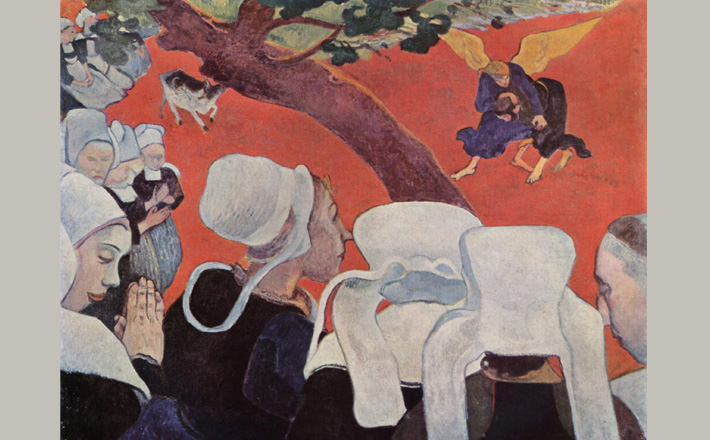Commentary on Genesis 32:22-31
What does it mean for God to wrestle with a human being and have the human opponent “prevail”?
What does it mean to have God commend Jacob for his success with God? What kind of God is this? Wrestling raises issues of bodily contact and power. The Godness of God seems to be compromised. Hence, efforts have often been made to work with textual issues in such a way that a more traditional understanding of God can be claimed for the text.
I make five introductory comments:
- The one whom Jacob encounters is God in human form; this understanding is congruent with Hosea 12.3-4, which speaks of Jacob’s antagonist as both “God” and “the angel.”
- God initiates the wrestling match with Jacob and has a positiveend in mind relative to Jacob’s imminent encounter with Esau. Inasmuch as Jacob was in the process of being obedient to God’s command to return to the land (Genesis 31:3-13), God does not seek to keep Jacob from responding positively.
- Jacob is endangered by the daylight; he would then “see” God (Genesis 32:30). So, God’s “let me go” (32:26) expresses a concern for Jacob’s future, not God’s.
- God’s naming Jacob as Israel (Genesis 32:28) is a divine commendationof who Jacob has been and still is, not least in view of his successful response to God’s wrestling initiative. The new name Israel is joined with the old name Jacob in the narratives that follow.
- God’s encountering Jacob has no disciplinary purpose. Jacob voices no repentance of sin and God extends no forgiveness to him. Jacob’s pattern of life continues much as before, even his deceptive behaviors (see Genesis 33:12-17).
I offer two comments about how issues relating to God’s power have affected the interpretation of God in this text.
(1) The translation of naga’ in Genesis 32:25, 32. Is it “touch” or “strike”? Translations differ. Given the extent of bodily contact in wrestling, there would be much touching for both parties. In such a long struggle, they would be touching each other all over, all the time! Hence, the translation “struck” is much more likely.
If we omit the “touch” translation possibility, we find no hint in the text that God could have overwhelmed Jacob at any moment God chose. Even God’s striking of Jacob is not said to enable God to move closer to winning the match. Jacob holds on until Jacob decides to let God go. God is not playing games with Jacob; God actually struggles with him. God does retain certain kinds of power: God strikes Jacob; God can do with Jacob’s name what Jacob is not able to do with God’s name; blessings come from God to Jacob, not from Jacob to God. But such forms of power do not finally enable the winning of wrestling matches.
(2) Did Jacob win, lose, or was it a draw? What is the sense of the twice-used verb “prevail” (Genesis 32:25, 28)? Jacob certainly bears some scars from the encounter (the claim that the limp was lifelong has no support in the text). That result, where the winner does not emerge unscathed, is not uncommon in wrestling matches. According to God’s own testimony, it is stated that, even after suffering the injury, Jacob has the upper hand (32:26). Indeed, the insistence of Jacob remains intact until God’s blessing occurs. In spite of the injury, Jacob “prevails.” It seems wisest to recognize, not only that God can be resisted, but successfully so. Indeed, God can lose! This is no draw, as God admits. The text witnesses to a human ability to resist divine assaults successfully, if not emerge unscathed.
The “prevail” theme in the text claims that it is Jacob who lets God go. God in human form had to request that he be released, and the release follows God’s blessing, which was the condition that Jacob had stated. The text does not say that it is God who decides when the match is over. Rather, when Jacob gets what he wants, he decides to let God go.
I conclude with some comments on God’s choice of the human body as a means in and through which God is active in the life of Jacob (and others). God’s assumption of a human form in the struggle with Jacob is not a unique divine move (see Genesis 18-19; Judges 13). God’s assuming a human form for a specific venture in the world does not compromise divine transcendence. The finite is capable of the infinite. In such theophanies God takes on human form in order to be as concretely present as possible. In assuming such a form, the personal and relational dimension of the divine is more sharply revealed; there is greater intensity of presence. Notably, God does not take on the form of, say, a giant, with an obvious ability to overpower the human and control the situation. At the same time, to collapse the distinction between God and God in human form would be misleading, but not because there is less than God present, but because there is more than God present (namely, the human form). It is God who appears, but enfleshed in human form.
Such a bodily divine appearance is also revealing of God’s vulnerability. One might cite the various negative human responses to such divine appearances, such as derision (Genesis 18:12-13) or incredulity (Judges 6:13-17). And, in this text, God is able to lose. Such key moments of embodiment in human form are revealing of God’s ways with the world more generally. God is enfleshed in bodies of weakness within the framework of everyday affairs, and not in the lineaments of overwhelming power. The vulnerable body riskily assumed by God in this wrestling match is a vehicle of divine immanence for the sake of genuine encounter.
To speak specifically as a Christian: The Old Testament does not finally come to the conclusion that God was fully incarnate in a human life or was present in complete unbrokenness. Yet, decisive continuities exist between such divine appearances and the Incarnation. First-century believers who had been steeped in Old Testament stories such as God’s wrestling with Jacob would not have been surprised by Incarnation.


October 16, 2016